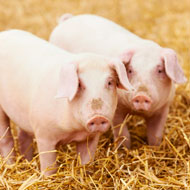BPEX launch new disease charter

"The early detection and reporting of these potentially costly diseases would enable rapid response measures to be put in place."
A new significant diseases charter has been launched by BPEX in response to threats from challenges such as Porcine Epidemic Diarrhoea (PEDv).
Produced as part of the contingency plan drawn up by the Pig Health and Welfare Council, the charter aims for producers to sign up to share information quickly in the event of an outbreak. In turn, this will make controlling the disease quicker and more effective.
"The success of the charter relies totally on the the voluntary commitment from producers and their vets to raise the alarm should they experience a disease breakdown," said BPEX veterinary team manager Martin Smith.
"The early detection and reporting of these potentially costly diseases would enable rapid response measures to be put in place to restrict their spread for the benefit of the whole of the British pig industry," he added.
To make the charter work, producers will be encouraged to sign up online. It will be co-ordinated by the Control Centre set up within BPEX using existing staff resources.
Farm vets have responsibility for reporting suspect PED or confirmed Swine Dysentery to the Control Centre, but they can only do this if they and the producer are signed up via Pig Hub as a charter member.
BPEX say that early access to this essential information will enable:
- Voluntary movement restrictions to be put in place immediately
- Expert industry assistance in containing, controlling and eliminating the infection
- The risk of spread to be greatly reduced
- Movement tracings and further testing to be implemented immediately
- Local and national reducers to increase their biosecurity measures
- Local and national produces to be extra vigilant looking for signs in their own stock



 HMRC has invited feedback to its communications regarding the employment status of locum vets and vet nurses.
HMRC has invited feedback to its communications regarding the employment status of locum vets and vet nurses.